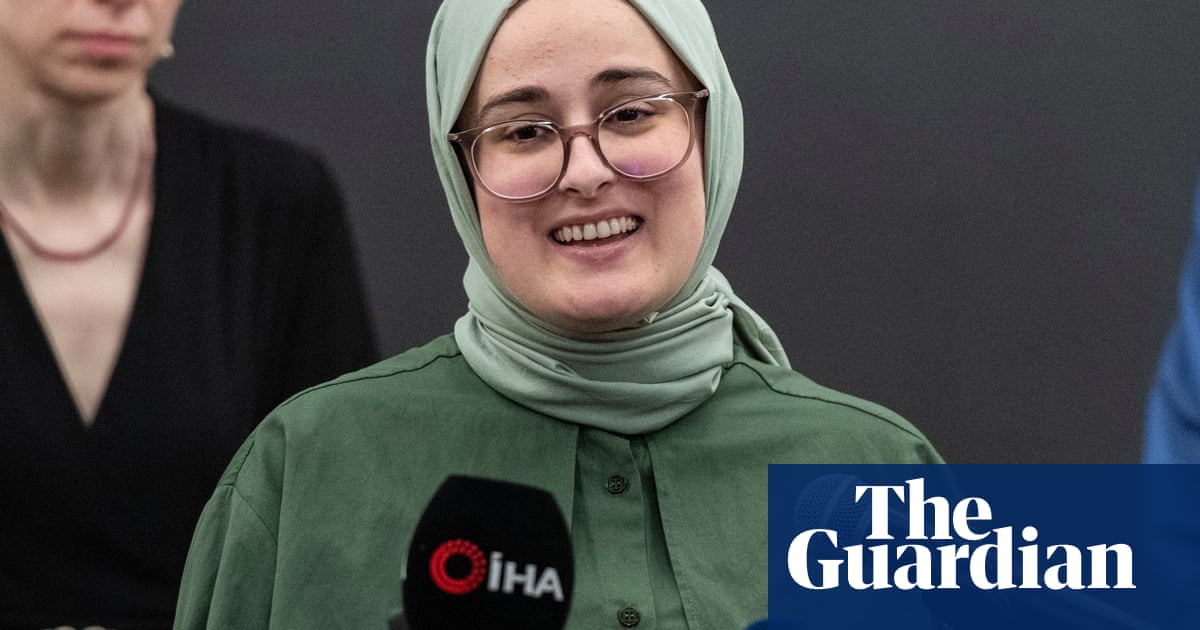A Tufts University student from Turkey has returned to Boston, one day afterbeing releasedfrom a Louisiana immigration detention center where she was held for more than six weeks after being arrested for her political speech.Rümeysa Öztürk told reporters at Logan Airport on Saturday that she was excited to get back to her studies during what has been a “very difficult” period.“In the last 45 days, I lost both my freedom and also my education during a crucial time for my doctoral studies,” she said. “But I am so grateful for all the support, kindness and care.”A federal judge ordered Öztürk’s release Fridaypending a final decisionon her claim that she was illegally detained following an op-ed she co-wrote last year criticizing her university’s response to Israel and the war in Gaza.
She filed a lawsuit challenging her detention now assigned to US district judge William Sessions in Burlington, Vermont. He granted her bail after finding she had raised substantial claims that her rights were violated.
Öztürk said she will continue her case in the courts, adding, “I have faith in the American system of justice.”“Today is a tremendous day as we welcome you back, Rumeysa,” Ed Markey, a Democrat senator fromMassachusettssaid. “You have made millions and millions of people across our country so proud of the way you have fought.”
Appearing by video for her bail hearing the previous day, Öztürk, 30, detailed her growing asthma attacks in detention and her desire to finish her doctorate focusing on children and social media.Judge Sessions ruled that she was to be released on her own recognizance with no travel restrictions. She was not a danger to the community or a flight risk, he said, while noting that he might amend the release order to consider any conditions by US Immigration and Customs Enforcement, or Ice, in consultation with her lawyers.Sessions said the government offered no evidence for why Öztürk was arrested other than the op-ed.The US justice department’s executive office for immigration review did not respond to an email message seeking comment.Öztürk was one of four students who wrote the opinion piece last year in campus newspaper The Tufts Daily. It criticized the university’s response to student activists demanding that Tufts “acknowledge the Palestinian genocide,” disclose its investments and divest from companies with ties to Israel.On 25 March immigration officials surrounded Öztürk in Massachusetts and took her into custody. She was then driven to New Hampshire and Vermont and flown to a detention center in Basile,Louisiana.Her student visa had been revoked several days earlier, but she was not informed of that, her lawyers said.
Öztürk is one ofseveral international studentsdetained by the Trump administration over their pro-Palestinian advocacy on campus.Öztürk’s lawyers first filed a petition on her behalf in Massachusetts, but they did not know where she was and were unable to speak to her until more than 24 hours after she was detained. A Massachusetts judge later transferred the case to Vermont.A state department memo said Öztürk’s visa was revoked following an assessment that her actions “‘may undermine US foreign policy by creating a hostile environment for Jewish students and indicating support for a designated terrorist organization including co-authoring an op-ed that found common cause with an organization that was later temporarily banned from campus”.A department of homeland security spokesperson said in March, without providing evidence, that investigations found that Öztürk engaged in activities in support of Hamas, which the US has designated as a terrorist group.This week a federal appeals court upheld Sessions’ order to bring Öztürk back to New England for hearings to determine whether her constitutional rights, including free speech and due process, were violated, as her lawyers argue.Immigration proceedings for Öztürk, initiated in Louisiana, are being conducted separately in that state and Öztürk can participate remotely, the court said.
